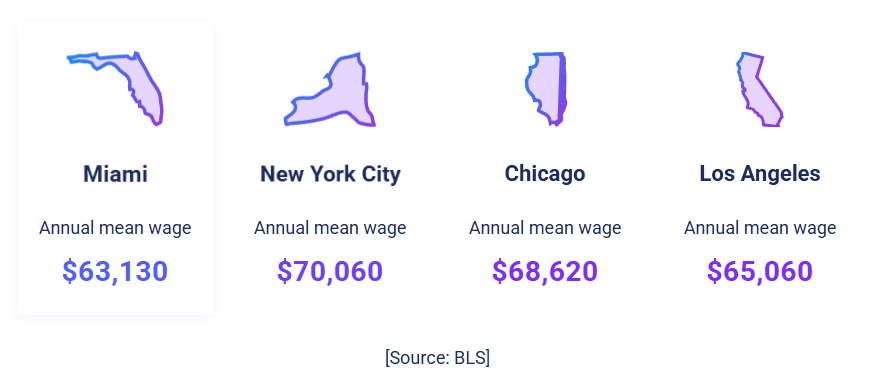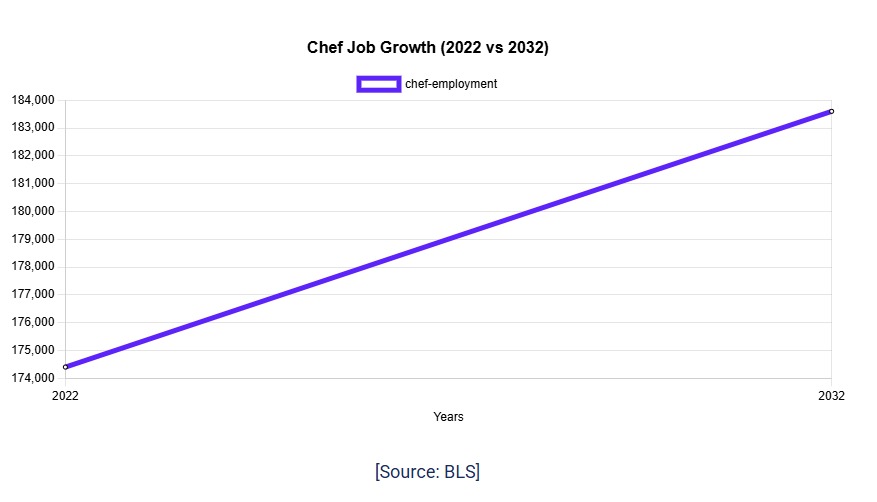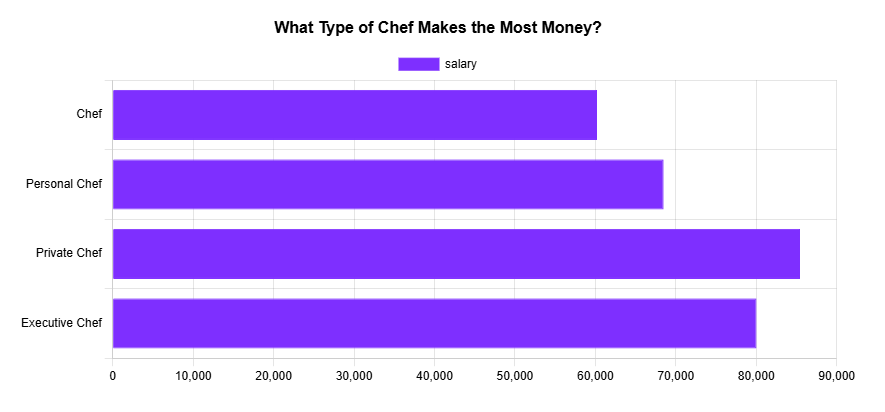Chef Career – 2025 Complete Guide on Duties & Salaries
This overview provides valuable insights into a Chef’s role, covering responsibilities, salary, career progression and frequently asked questions.
What Is a Chef?
A Chef is a culinary professional responsible for creating and executing menus, supervising kitchen staff and ensuring the quality and consistency of dishes served to customers.
A Chef’s role involves overseeing food preparation, cooking and presentation in various establishments, such as restaurants, hotels or catering services.
What Does a Chef Do?
A Chef’s day-to-day responsibilities include:
- Planning and developing menus that reflect the culinary concept and preferences of the establishment
- Overseeing food preparation, cooking and presentation to maintain high standards of quality and consistency
- Managing kitchen staff
- Monitoring inventory levels, ordering ingredients and controlling food costs to maximize profitability
- Adhering to food safety regulations and sanitation guidelines to maintain a clean and safe kitchen environment
- Supervising the upkeep and fixing of kitchen appliances
- Collaborating with other departments, such as front-of-house staff and management, to ensure smooth service and customer satisfaction
- Establishing and maintaining relationships with suppliers to ensure timely delivery of ingredients

Chef Salary in the US
The average base salary for a Chef in the United States is $60,210 per year, according to the Bureau of Labor Statistics (BLS).
Hawaii tops the list as the highest-paying state for Chefs, offering an average salary of $99,520, while Oklahoma ranks at the bottom with the lowest average salary of $39,130.
Salary ranges for Chefs vary depending on the type of industry they’re working in, whether they receive tips or not and their level of experience and educational background.
Salaries also differ depending on demand. Among these four major U.S. cities, New York City is the top-paying city for Chefs followed by Los Angeles, Chicago, and Miami.

New York City is known for its dynamic food scene and being one of the most culturally diverse cities in the world. This contributes to the demand for skilled Chefs who can provide high-quality dining experiences, leading to competitive salaries.
What Is the Workplace of a Chef Like?
A Chef’s workplace is usually a busy kitchen, in a restaurant, hotel or other food service establishment. It’s equipped with all the equipment necessary for food preparation and cooking.
The kitchen environment is fast-paced, requiring Chefs to thrive in such conditions. In addition to overseeing cooking operations, they lead and coordinate kitchen staff to ensure efficient teamwork and smooth service delivery.
Chefs work long hours, often standing and dealing with heat. They are often required to work evenings, weekends and holidays to accommodate peak dining times and special events.
While the role of a Chef may be demanding, it offers opportunities for creativity, innovation and professional growth.
Advice From MasterChef Contestants
OysterLink recently interviewed Michael Leonard and Christopher Murton, competitors on MasterChef Generations. Michael Leonard actually won the entire competition.
We asked them what was the best career advice they got, and this was their response.
What is the best career advice you got?
Murt: "Mistakes are fine, but the key is to learn from them. Don’t keep making the same mistake over and over — that’s really stuck with me."
Michael: "Hmm, that’s a tough one. I’ve gotten a lot of career advice, but I think this ties back to the mentor conversation. Meeting Gordon Ramsay was huge for me — he’s been my idol. I’ve talked about this in other interviews, but one of the main things he emphasized was confidence. He’s always talking about being a Confident chef, and that stuck with me."
Michael Leonard and Christopher Murton, MasterChef Generations
Chef Industry Trends in 2025
The culinary industry is expected to grow steadily in the coming years, with job opportunities increasing by 5% from 2022 to 2032.
According to BLS, this growth translates to approximately 22,000 job openings annually over the next decade.

The majority of these openings come from Chefs switching industries or retiring.
States that offer significant employment opportunities for Chefs include California, Texas, Florida, New York and Illinois.
Meanwhile, states that offer the highest compensation for this role include Hawaii, Rhode Island, Massachusetts and New Jersey.
Which Chef Jobs Pay the Most?
Positions such as Executive Chef, Private Chef and Personal Chef typically command higher salaries compared to the standard Chef position due to factors such as:
- Experience and expertise
- Leadership management
- Creativity and innovation
- Responsibility and accountability
- Clientele and demands
- Work environment
Executive Chefs usually have years of experience under their belt. Having extensive experience allows them to negotiate for a higher salary, as it indicates mastery of various cuisines, cooking techniques and ingredients.
In addition, Executive Chefs shoulder the responsibility of staff management, a role that demands excellent leadership skills to guide and motivate their team. The seamless operation of kitchen staff is important to the success of any establishment, justifying the higher compensation for Executive Chefs.
Personal Chefs, on the other hand, earn high salaries because of their ability to customize menus and meals according to the specific tastes and preferences of their clients. This ability requires skills such as creativity and innovation, which are essential for consistently delivering unique and tailored culinary experiences.
For Private Chefs, it's usually the clientele they serve that allows them to earn high salaries. They often work directly for high-net-worth individuals, such as celebrities, who are willing to pay a premium for personalized culinary services.

How To Become a Chef
There are many ways to become a Chef. Some start by earning a culinary degree, while others rely solely on years of experience.
If you're interested in working in this role, we have a step-by-step guide explaining how to become a Chef. It covers how you can start working as a Chef by first getting a job in an entry-level position, as well as different kinds of Chefs based on their tasks and responsibilities.
Top Skills of the Best Chef
The best Chefs possess culinary expertise, time management skills, creativity, leadership and adaptability.
- Culinary Expertise: Chefs must master different culinary techniques, ingredients, flavors and food preparation methodologies.
- Time Management: Chefs must be able to manage their time effectively to guarantee timely preparation and serving of meals.
- Creativity: The best Chefs are creative visionaries, constantly exploring new ingredients, techniques and presentation styles to craft extraordinary and memorable dining experiences.
- Leadership: Chefs must possess excellent leadership skills to guide kitchen staff, delegate tasks and ensure the smooth operations of the establishment they’re working in.
- Adaptability: Chefs must be quick to address challenges and adapt to changes in the kitchen environment.
Chef Training Programs and Schools To Consider
There are several culinary institutes available for professionals interested in developing their skills. Some reputable establishments offering culinary education are as follows:
- Culinary Institute of America (CIA): CIA is a private, not-for-profit college that offers degree and certificate programs for both professionals and cooking enthusiasts. They have campuses in Texas, New York and California.
- American Culinary Federation (ACF): Established in 1929, ACF is a professional organization that offers many certification programs such as Certified Pastry Culinarian, Certified Culinarian and Certified Fundamentals Cook.
- Auguste Escoffier School of Culinary Arts: Escoffier offers an online cooking course where you’ll be taught by professional Chef instructors, engage in classroom discussions and polish your cooking techniques.
Here are other certification programs, you might want to consider taking.
